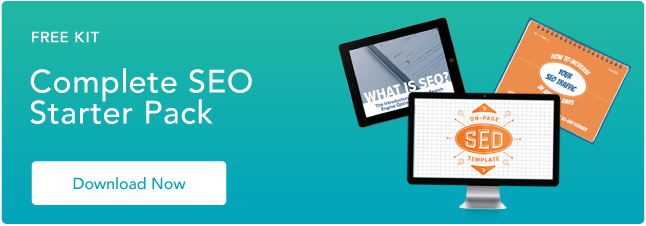We are currently living in the age of the internet, and that means your business must cater to it. Promoting your business, your brand, and your product or service can all benefit from digital marketing.

There is an audience to be reached online and a reputation to build from your presence. There is, however, a right and a wrong way to do digital marketing. Check out these common mistakes to make sure you are doing it effectively.
![→ Download Now: SEO Starter Pack [Free Kit]](https://no-cache.hubspot.com/cta/default/53/1d7211ac-7b1b-4405-b940-54b8acedb26e.png)
Digital Marketing Mistakes
- Not Having a Blog
- Avoiding Social Media
- Forgetting About Mobile Users
- Not Offering Discounts and Promotions
- Underutilizing Keyword Research
- Targeting a Broad Audience
- Having Subpar Customer Service
- Ignoring the Competition
- Not Using Social Proof
- Lacking a Clear Strategy
- Failing to Convert Web Traffic to Customers
- Having Poor Website Design
- Not Tracking Your Leads
1. Not Having a Blog
Remember that you are not only trying to market your site as a business, you are also trying to market yourself as a trusted industry leader. Publishing blog content that is valuable, informed, and accessible will establish you as a voice to be trusted. Additionally, each blog post is another indexed page for your site, and more indexed pages lead to your site showing up more in Google search results.
Don’t just create the blog, it’s also important for it to be interactive. Ask questions in the comment section to get responses. Also, add guest posts or interviews from researchers or successful professionals in your field. Utilize this blog post writing guide for creating the most impactful post each time.
2. Avoiding Social Media
You might think you can get away with not using social media. I’m sorry to tell you that you’re wrong! It’s an essential way to turn leads into customers. Spreading your content, reaching your audience, and engaging with users will help you promote your business online. But don’t try to do it all yourself; learn why you need a social media manager.
3. Forgetting About Mobile Users
Mobile browsing accounts for about half of web traffic worldwide. So, as you are optimizing your site, don’t forget to also optimize it for mobile users so that the load time is equally as fast as on desktop. Ensure the design of your site is also adjusted to be viewed on mobile.
4. Not Offering Discounts and Promotions
A survey from Retail Me Not revealed that two-thirds of customers made an unplanned purchase solely because of a discount. Online coupon codes or limited time offers are great pop-ups for your site, especially on the landing page or when they may abandon their cart. Your site should also have a call-to-action that can be incentivized with a promotion.
5. Underutilizing Keyword Research
Potential customers need to be able to find you online, so it’s essential to focus on SEO. Identify what keywords are the most relevant, have high search volume, and are relatively easy to rank for. Then, monitor where you rank for each keyword, how much traffic you’re getting from each keyword, and whether the visitors coming from that keyword are turning into leads.
6. Targeting a Broad Audience
Spending your marketing budget to reach as many people as possible isn’t an efficient use of your money. Pinpoint a clearly defined target market that will yield more relevant leads.
Don’t make assumptions or rely on guesses for information about any audiences. Do your research to determine your target audience and the best way to reach them.
7. Having Subpar Customer Service
A visitor who hasn’t done business with you before is taking a risk if they choose to become a customer. Having good customer service is important to lower that risk, because 70% of customers will continue business with you if their complaints were resolved well.
Offer help in a clear place on your site so that visitors know they have access to it. This may be a Contact Us page, a 24/7 virtual chat box, a helpline, or other methods. Just be sure that if someone goes to your site, they clearly see they will have help if they need it.
8. Ignoring the Competition
It’s likely that there is someone else out there offering the same thing you are. Don’t pretend that they don’t exist; instead, find a way to stand out. Figure out what makes your brand special and highlight it on your site. It should be loud and clear on your site what makes you different from the competition.
9. Not Using Social Proof
Seeing examples of happy, satisfied customers encourages more conversions. Testimonials, case studies, and success stories ensure your web visitors that other people are happy with your business. They can feel reassured that they will be too.
10. Lacking a Clear Strategy
Without a plan and a vision, there are no goals to track or research-backed methods. This can often be a waste of time, money, and resources. Start building your marketing strategy by defining your target audience, setting reasonable goals, understanding what you need to achieve them, and keeping track of your progress.
11. Failing to Convert Web Traffic to Customers
Visitors to your website who don’t end up becoming customers have little value, unless they happen to do some word-of-mouth advertising for you that introduces a lead. Getting visitors to your site is goal number one, but goal number two is to turn them into customers. Develop a strategy for converting web traffic into sales.
12. Having Poor Website Design
A website that is constructed with digital marketing in mind should have a call to action and a well-optimized landing page. Any promotions or discounts should also be displayed front and center. Having an informative and inviting website is important in your efforts to turn visitors into fruitful leads.
13. Not Tracking Your Leads
Online leads can come from a variety of traffic sources such as keywords, email blasts, referring links, social media, etc. One of those sources might be pulling in leads that rarely turn into customers, while another might be consistently garnering them. This is important to know so that you can adjust your strategy accordingly.
The Power of Digital Marketing
Your business needs the proper marketing tools and strategies to thrive. Digital marketing opens you up to endless opportunities for learning and growth. Boost your business to its highest potential by fixing your digital marketing strategy, targeting the right leads, and creating an optimized website.
Editor's note: This post was originally published in October 2008 and has been updated for comprehensiveness.

![24 Digital Marketing Tips That HubSpot Swears By [Research]](https://www.hubspot.com/hubfs/digital-marketing-tips_0.webp)





![A Guide to Growing and Engaging your Membership Base [New Ebook]](http://53.fs1.hubspotusercontent-na1.net/hubfs/53/ORG-Nonprofit/networkofpeople.jpg)


